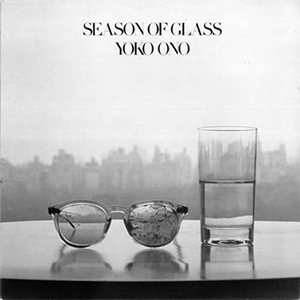YOKO ONO
Season of Glass
[Geffen GHS 2004]
A remarkable balance and blend of experimentalism and the more commercial pop sensibility present on Double Fantasy, Season of Glass is Yoko Ono’s most accessible, mature, and consistent album to date.
In her touching liner notes, Yoko says, “John was right here with me .... That is why this album is not dedicated to him,” and indeed one does feel Lennon’s spirit throughout the record. Even if one can’t say how many of the lyrics, if any, were directly inspired by his death, the zenith Yoko reaches on the album probably was.
The content of Glass ranges in tone from angry and disturbing, to that of calm. Restraining herself from the didacticism and self-indulgence which weakened her earlier work, Yoko does not preach to us about Lennon’s death as she might have, but rather reawakens and reminds us of our (her) sense of sadness, anger and loss, with two songs as especially poignant and direct reminders.
“I Don’t Know Why’ - in tone and some of the guitar work reminiscent of Lennon’s “I Want You” - is the fullest expression of her grief, rage, sense of loss and struggle to come to terms with his death. It is impossible not to feel renewed anger at his senseless murder when she shrieks, “You bastards! Hate us! Hate me! We had everything. You…“ (However, one of Yoko’s most persistent qualities is that words are not always what they seem. Just as the lyric “How dare they take my man away” from one of her earlier albums seems prescient, both lyrics might easily be directed at the many condemnations she has suffered for her art and for her role in the breakup of the Beatles.
 Some might question the taste of prefacing “No, No, No” with four gunshots and an anguished scream, but what better way to conjure up the feeling of shock and incredulousness many felt upon hearing of the shooting. But the sense of emptiness and sadness is most sharply felt when john and Yoko’s son, Sean, says in the middle of telling a story, “I learned this from my daddy, you know.” If Yoko can’t bring back the numbness some of us felt, she manages to bring back everything else.
Some might question the taste of prefacing “No, No, No” with four gunshots and an anguished scream, but what better way to conjure up the feeling of shock and incredulousness many felt upon hearing of the shooting. But the sense of emptiness and sadness is most sharply felt when john and Yoko’s son, Sean, says in the middle of telling a story, “I learned this from my daddy, you know.” If Yoko can’t bring back the numbness some of us felt, she manages to bring back everything else.
“Extension 33,” and “Dogtown” stylistically echo Yoko’s single, “Walking on Thin Ice,” but lyrically remind one of frequent earlier themes: The former telling the story of someone who runs away from a relationship (something Yoko admitted frequently doing before she met John), the latter restating the “Oh how happy we would be if the world were ruled by femininity” refrain.
While nothing on Glass matches the humor and wit of Feeling the Space or Approximately Infinite Universe, its best song “She Gets Down on Her Knees,” is a wonderful example of Yoko’s ironic lyrical and musical wit. “She gets down on her knees to make up life/That’s the only way she does it good,” is punctuated with a musical interlude which allows the meaning to set in. The irony continues with, “She’s a mainliner who’s never took a main line/She’s a one liner who’s never found the one line,” sung in her unique avant/new wave vocal style.
Despite tragedy, Yoko still displays the hope of a better world underlying all her work. While much of her early art was purposely ephemeral, with Season of Glass she has made a clear and lasting personal statement that exercises both the head and heart.
-Leila L’Abate